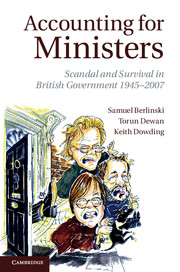Book contents
- Frontmatter
- Contents
- List of figures
- List of tables
- Preface and acknowledgements
- 1 Introduction
- 2 Managing the cabinet: principal–agent relations in government
- 3 The structure of British government
- 4 Who serves in government and how long do they last?
- 5 The prime minister and cabinet
- 6 Performance measures and forced exits
- 7 Ministerial performance and tenure
- 8 Conclusion
- References
- Index
1 - Introduction
Published online by Cambridge University Press: 05 April 2012
- Frontmatter
- Contents
- List of figures
- List of tables
- Preface and acknowledgements
- 1 Introduction
- 2 Managing the cabinet: principal–agent relations in government
- 3 The structure of British government
- 4 Who serves in government and how long do they last?
- 5 The prime minister and cabinet
- 6 Performance measures and forced exits
- 7 Ministerial performance and tenure
- 8 Conclusion
- References
- Index
Summary
Who serves in government and how long they serve for are important determinants of political performance. Whilst this much is understood, at least since Max Weber (1978), there are few data available that allow us to explore in more depth how political careers are formed and what determines the career trajectories of members of the ruling executive. This book looks at the careers of ministers who served in British government between 1945 and 2007. Using a unique dataset on the personal characteristics of ministers it analyses when they entered government, what happened to them during their spell in government, and the timing of their exit from government. One of the key variables of interest in our analysis is how long these ministers serve. We ask: to what extent does the length of their spell depend upon characteristics that are fixed at the time of their entry? What effect do political events, such as calls for a minister to resign perhaps connected to performance-related issues or other scandals, have upon their tenure? And what do the data on ministerial careers tell us about the nature of accountability in British politics?
The book is the first to offer micro-level data on British political careers that allow us to understand the career trajectories of different ministers in British government: some ministers rise whilst others fall, but what determines these patterns? This aspect of our book provides a much-needed addition to the study of parliamentary democracies.
- Type
- Chapter
- Information
- Accounting for MinistersScandal and Survival in British Government 1945–2007, pp. 1 - 5Publisher: Cambridge University PressPrint publication year: 2012

